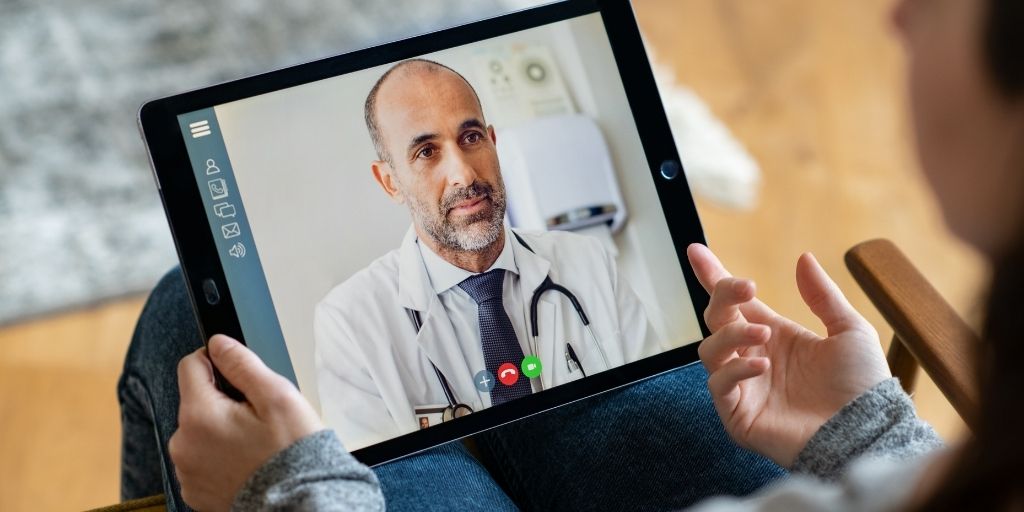
Dr Ian Jackson, Medical Director and Clinical Safety Officer at Refero, discusses the next chapter for teleconsultation in the NHS
This time last year, I said that teleconsultation will come of age in 2020 and will be used increasingly across multiple health sectors. While I failed to predict some of the more pressing events of the year that was, there’s no doubt that video appointments became a focal point in primary and secondary care delivery, as health professionals turned to tech in the fight against Covid-19.
In March 2020, GPs across the country were urged to assess patients online or via telephone and video appointments to mitigate the spread of the virus. In June, Health Secretary Matt Hancock said there had been a “hugely positive” response to virtual appointments since the start of the pandemic, and that “people should have phone or video consultations with their doctors unless there is a clinical reason not to”.
Virtual appointments act as a lifeline
When speaking to my front line colleagues, I’m hearing that virtual appointments have acted as a lifeline, particularly when the UK went into the first and second national lockdowns.
Adopting video is something that St Helens and Knowsley Teaching Hospitals NHS Trust (STHK) came to independently some time ago. A successful two-year pilot saw the Trust trial video consultation technology with its Cancer Drains Outreach and Stroke Review services. The pilot allowed patients to become digitally connected with clinicians and enabled continual engagement via video consultation and messaging through a web portal, smartphone or tablet.
As we continue to navigate this pandemic, STHK is minimising footfall in the building by utilising video consultation technology.
According to NHSx, over two million video consultations have now taken place in secondary care. A survey conducted in June for the British Medical Association showed that 95% of GPs were offering remote consultations and 88% wanted to see greater use of them continue in the future. NHS Digital estimated that half of the 102 million appointments from March to July 2020 were by video or phone call. Yet, according to its appointments data for October, 60% of GP appointments took place face-to-face, 35% were held over the phone, and just 0.49% were via video or online. The option may be there for many, but we can see there is still significant work to be done to encourage most doctors and patients to try a different approach.
Supporting ICU at a pivotal point
At the time of writing, our hospitals are close to full capacity, and England is in its third national lockdown. Communications technology remains a vital step forward in tackling this virus, particularly in intensive care. It is far too risky for family and friends to visit patients in ICUs. At present, most ICUs rely on apps like Facetime or Skype to connect with families of their patients. This is concerning, as governance and security considerations haven’t been adhered to, as these apps haven’t been designed for sensitive medical use. Better communication would not only benefit the mental health of families anxious for news but also encourage the patient on their road to recovery, or sadly help families understand better if their loved one didn’t pull through.
Safeguarding for the future
Secondary care has come under criticism in recent months for postponing many elective clinics. It is crucial to reduce footfall into hospitals, and delays are unfortunately unavoidable for the foreseeable future. But I’d like to remind NHS colleagues that there are patients who can be supported at home and teleconsultation adds to hospitals’ ability to manage these.
At STHK, departments have recorded that 100% of its patients who’ve had virtual appointments have said this method is their preferred choice. Video consultations have helped to determine that 70-80 percent of the time, a hospital visit isn’t required.
The next chapter in teleconsultation
The NHS has now published a £75million tender for the provision of online and video consultations. The tender notice, revealed the NHS is looking for “suitably experienced and qualified” suppliers to join the Digital First, Online Consultation and Video Consultation (DFOCVC) Framework, which aims to deliver commitments in the NHS Long Term Plan to support online consultation in general practice.
The Health Secretary has warned that the UK has reached its “worst point” of the pandemic, and as video consultation approaches its next chapter, there are several factors GPs and secondary care providers can consider when choosing a video consultation provider: choose a system that does not require software patches to be downloaded; choose a system that will work with your current technology – a portal/cloud based; choose a system that emulates current clinical workflow – so clinicians can see a list of patients for their clinic, and can see who is logged in and waiting to be seen. Importantly, choose a supplier who has commitment and evidence they can integrate into your electronic patient record or patient administration system. You do not want staff having to enter patient data twice on two separate systems to organise a single appointment.
Video appointments rose to the challenge in 2020 and showed healthcare what it is capable of. In 2021, it’s time for the sector to put the technology to good use.











